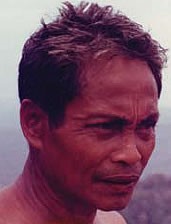Bonggi in Malaysia

Photo Source:
Copyrighted © 2026
Southeast Asia Link - SEALINK All rights reserved. Used with permission |
Send Joshua Project a map of this people group.
|
| People Name: | Bonggi |
| Country: | Malaysia |
| 10/40 Window: | Yes |
| Population: | 5,800 |
| World Population: | 5,800 |
| Primary Language: | Bonggi |
| Primary Religion: | Ethnic Religions |
| Christian Adherents: | 20.00 % |
| Evangelicals: | 1.50 % |
| Scripture: | Portions |
| Ministry Resources: | Yes |
| Jesus Film: | No |
| Audio Recordings: | No |
| People Cluster: | Borneo-Kalimantan |
| Affinity Bloc: | Malay Peoples |
| Progress Level: |
|
Introduction / History
The Bonggi people are mainly found on Banggi and Balambangan Islands at the northernmost point of Sabah, Malaysia. Non-Bonggi and other outsiders commonly refer to them as "Banggi" or "Dusun Banggi". They are a peace-loving, non-violent group. Historically and contemporarily, they tend to avoid conflicts. The Bonggi speak the Bonggi language, which is distantly related to the Molbog language in the Philippines.
What Are Their Lives Like?
The majority of the Bonggi work as subsistence farmers and subsistence fishermen. They are only small-scale producers depending on simple technology. They plant cassava, maize, banana, papaya, sugarcane, tobacco, tuba (derris elliptica), and sweet potatoes. Coconut farming is their main source of cash income. They use hook and line, small nets, poison, and spears for fishing.
Bonggi communities consist of scattered homesteads with no unifying social centers. Many Bonggi chew betel nut, which has become a part of their identity; sharing betel ingredients gives them a chance to interact.
A pakng lima 'headman' is appointed by the government mainly to settle disputes and legal issues and to help communicate to the government on behalf of the village people any of their needs such as health services or building a dock. Intermarriages are allowed but not favored; on the other hand, marriages to a first cousin are permitted.
What Are Their Beliefs?
The majority of the Bonggi are influenced by animistic beliefs and various superstitions. They resist other religious beliefs, which they see as foreign to their own customary laws. There are many customs pertaining to dominating the spirit world. For example: if a Bonggi can obtain strands of someone's hair, or a tooth, or used tobacco or dirt from a footprint, and bring it to 'an evil rock spirit' (kuakng batu), then the evil spirit will have the power to make that person sick. The Bonggi believe that babies and small children should wear amulets to protect them against evil spirits.
The Bonggi follow certain beliefs in treating illnesses. One example of a common taboo is not to eat any food that is red once a person is afflicted with an illness that causes red rashes. Therefore, food such as crabs, papaya, red chili, and watermelon are forbidden for the person with such an illness.
What Are Their Needs?
Modern farming and fishing methods and technology could be introduced to the Bonggi people. Developing an infrastructure such as good land and sea transportation could provide them opportunities to sell farm produce in neighboring places. There is also a need for education as their illiteracy rate is still quite high.
Prayer Points
Pray for teachers to help educate and provide quality teaching materials to the Bonggi children and youth.
Pray for believers who have knowledge in these areas to help the people.
Pray for a full harvest of Bonggi souls to belong to Jesus, the King of kings.